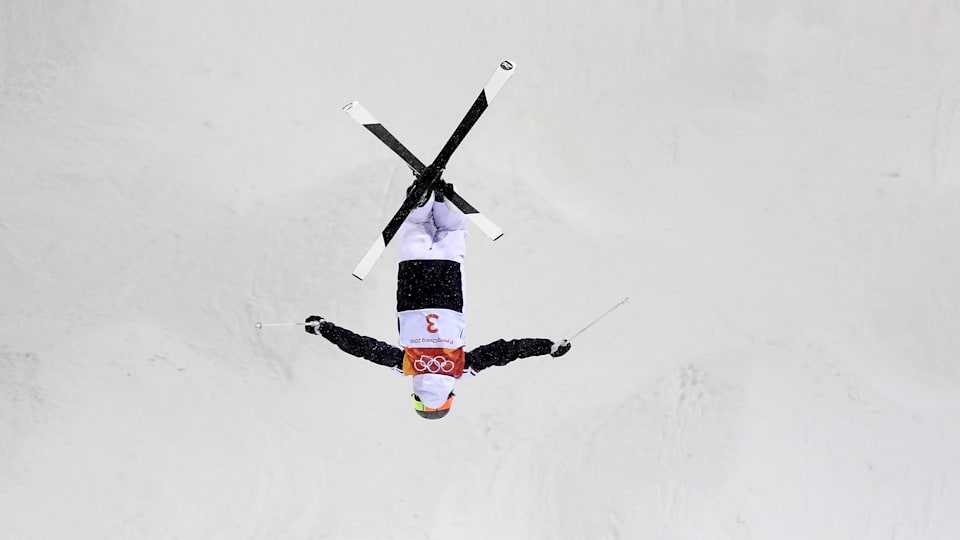Women’s freestyle skiers turn on the style at PyeongChang 2018
France’s Perrine Laffont kicked off the women’s freestyle skiing events at PyeongChang 2018 by claiming moguls gold, before Cassie Sharpe of Canada won the halfpipe title. Sarah Hofflin and Mathilde Gremaud made it a Swiss one-two in the slopestyle and Hanna Huskova of Belarus prevailed in the aerials competition. The competition ended with Canada’s Kelsey Serwa topping the podium in ski cross.

Laffont times her charge to perfection
After battling her way through to the six-skier moguls final, France’s Laffont pulled out all the stops to score 78.65 points and take the gold by 0.09 points from defending Olympic champion Justine Dufour-Lapointe of Canada, with Kazakhstan’s Yulia Galysheva securing the bronze. Sixth in the first final, third in the second and first in the last, Laffont could not have timed her challenge any better.
“It’s just crazy,” said the new Olympic champion afterwards. “I’ve dreamed of this so many times, visualised it so many times, and suffered so many times too, which is what makes this such an incredible feeling.”
Dufour-Lapointe registered the day’s highest score of 79.50 points in the first final but was slightly slower than Laffont in the third final and just behind her on points. “I produced the best run in the best time and the decision was all down to the judges. I knew that if I could do that the colour of the medal wouldn’t really matter,” said the silver medallist.
Galysheva, who totalled 77.40 points on her final run, is confident she can do even better at Tokyo 2020: “I’ve gone from 11th to seventh and now to third. Next time I’ll be first.”
Huskova soars to aerials success
The aerials super final came down to a duel between Huskova and China’s Zhang Xin, one that the Belarusian won with a back-lay-full-full that earned her 96.14 points. Zhang’s final effort brought her 95.52 points and the silver, with compatriot Kong Fanyu claiming the bronze. Defending champion Alla Tsuper of Belarus saw her hopes of winning a second gold at the age of 38 end when she fell on attempting to land a back-full-full-full.
A first-time World Cup event winner in December 2017, 26-year-old Huskova is the fourth Olympic aerials champion from Belarus, after Alexei Grishin, who took the men’s gold at Vancouver 2010, and Anton Kushnir and Tsuper, who swept the board at Sochi 2014.
‘We have our own strategy in Belarus,” said Huskova. “It’s a team effort.” When asked why she chose to focus on aerials, she responded: “I didn’t choose this sport; it chose me.”
Swiss duo Höfflin and Gremaud double up
Switzerland’s Höfflin edged out compatriot and Winter Youth Olympic Games veteran Gremaud to claim slopestyle gold, with Great Britain’s Isabel Atkin completing the podium.
Winner of a solitary event prior to PyeongChang 2018, Höfflin made the gold hers on her third and final run, which she ended with a switch left double 900 – a trick no other competitor attempted – to score 91.20 points.
“I can’t believe it,” said the Swiss skier. “I’m so happy it all worked out for me because I was struggling in training. For me, it’s not so much the medal as the way I ski that matters.”
Gremaud, nine years the 27-year-old champion’s junior, totalled 88.00 points on her first run but was unable to improve on it, while 19-year-old Atkin climbed up to third after scoring 84.60 on her third attempt to give her country its first ever Olympic skiing medal.
Halfpipe glory goes to Sharpe
Canada's Cassie Sharpe aced the halfpipe final, scoring 95.80 points on her second run to win the first Olympic gold medal of her career. The silver went to France’s Marie Martinod, the Sochi 2014 runner-up, and the bronze to the USA’s Brita Sigourney.
Making the most of perfect conditions at the Phoenix Snow Park, the Canadian followed up a fine first run that earned her 94.40 points by landing back-to-back 900s and a cork 1080 spun to her left. Though she fell on her third descent, she had done more than enough to take the gold and go one better than the world championship silver she collected in 2017.
“It hasn’t really sunk in yet, but it’s just an incredible feeling,” Sharpe said. “It’s just everything wrapped up into one.”
“This second place is proof that I was right to come back after having my daughter. It’s reward for all the work I’ve done,” said Martinod, the oldest competitor in the final at 33, who returned to the sport in 2011 after several seasons out. “It’s also a sign for me to leave the circuit with a message for all the girls: ‘If you want to fight you can fight to the end, and if you take care of yourself you can do it until you’re at least 33’.”
Serwa rewarded for her staying power
Canadian Serwa finally made it to the top of the ski cross podium after placing fifth at Vancouver 2010 and winning silver at Sochi 2014. Second in her semi-final behind compatriot Brittany Phelan, Serwa reversed the order in the final, edging into the lead at the top of the course and pulling away to complete a comfortable win.
Phelan shot from fourth to second on a left-hander halfway down the course and stayed there to clinch the silver, while Switzerland’s Fanny Smith held off reigning world champion Sandra Näslund of Sweden in the battle for the bronze.
“I had a plan and executed it,” Serwa said. “And to be there with my teammate and best friend Britt is very cool. It is surreal to be the best in the world at something you put your heart into. Our skis were rockets today.”
Phelan switched from slalom to ski cross after suffering a serious injury in 2015. “It was a sign for me,” said the silver medallist. “I felt in my heart that I needed to take a different direction.”
